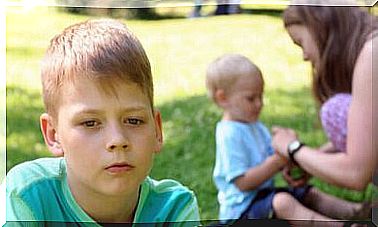Being An Intrusive Mother: The Consequences – Being Parents

Many young people complain that their parents do not respect their privacy, that they continually control them and that they want to know everything that is going on in their life. Obviously, as a mother and responsible for her physical and emotional well-being, you need to be informed about her daily life. However, being an intrusive mom can lead to more problems than benefits.
In reality, the line between being an involved mother and an intrusive mother is not always very clear. Balancing neglect through abandonment and intromission is a task one learns as one progresses through motherhood.
We must still be able to provide a space for our children, which corresponds to their level of maturity and development because, otherwise, we may get unpleasant reactions and fall into unhealthy dynamics.

What is an intrusive mother?
An intrusive mother is one who demands to know every detail of her child’s life. However, it does not do so with an intention to be aware and to accompany, but with a desire to control, direct and apply the solutions which it considers to be the most adequate, in a unilateral way.
These types of mothers can pressure their children to share every experience of their daily life, to even talk about emotions they don’t want to share, and to do so when they have it. themselves decided. They claim to do it out of love and concern, but in reality they maintain a lack of empathic control.
These mothers do not seek to create a bond of trust with their children and to build a safe space that makes them want to express themselves freely. Quite the contrary: they demand to be aware of everything and manipulate them so that they reveal the information sought.
They may also fall into behaviors such as rummaging through their children’s personal items, talking to their friends without their consent, or spying on the contents of their cell phones. The end justifies the means, even if it means disturbing the teenager, violating their privacy, or crossing the limits of trust.
Being an intrusive mother: the consequences
Mothers who have this type of behavior think that they are acting for the good of their child. They feel that this control will prevent them from making mistakes or that this way they will know when they need help. However, the results they obtain are often very different.
Initially, we indicate to the child, through these behaviors, that we do not have confidence in him. This is why we need to control and know everything he does.
Trust is an essential element in the mother-child relationship, which must be worked on from both sides. If you don’t allow your child to gradually gain this trust, if you don’t give him the opportunity, he will be even more likely to hide what he is doing. If you don’t trust him, he won’t trust you.
On the other hand, the intrusive mother, with her behaviors, conveys to her child the idea that she does not think him capable of managing his own life. When, for example, she is constantly behind his back asking him what homework he has to do, deciding how and when to do them, she doesn’t believe in his sense of responsibility. The child will then not believe in his own capacities and the development of his autonomy will be limited.
Finally, the pressure exerted can lead the child to think that making mistakes is not acceptable. If his mother is always there watching him and telling him how to do things, it’s because failing is not an option. This can therefore lead to perfectionist and self-demanding attitudes which will be very harmful.

Respect his space
To prevent all of the above from happening, it is important to respect your children’s space, to a degree that matches their age and maturity.
Adolescents will need a lot more privacy than children and will not need their parents to be behind them to fulfill many of their obligations. It is essential to trust them and allow them to make their own decisions, to make mistakes and to correct themselves by learning from their own mistakes.









